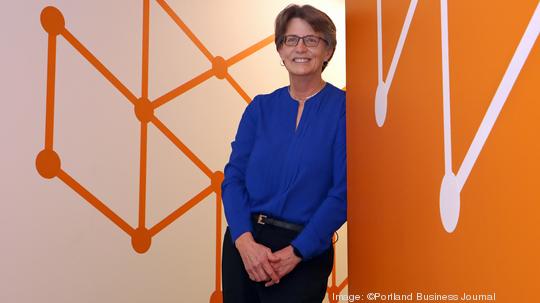
Leah Frye started her professional life as a chemistry professor at Rensselaer Polytechnic Institute but soon realized she could have a more direct impact outside of academia.
Two career stops later, she landed at Schrödinger, a biotech company that is headquartered in New York but that has offices around the world, including one in Portland.
Schrödinger (Nasdaq: SDGR) pioneered a physics-based software platform for discovering high-quality, novel molecules for drug development, more rapidly and at lower cost than traditional models. Schrödinger has extensive partnerships with major pharmaceutical companies.
Frye, who has 20 patents to her name, co-founded and led Schrödinger’s Drug Discovery Group. Her team, which now numbers 80, built a virtual screening business and moved on to drug design with industry collaborations and, eventually, their own drug discovery pipeline.
“Under Leah’s leadership, the Drug Discovery Group has shifted its business strategy from outsourcing software to focus on collaborations with other leading biopharma companies, which has resulted in two FDA approved drugs,” President and CEO Ramy Farid said. “Today, Schrödinger also has a robust internal drug discovery pipeline that was built upon the foundation Leah helped create in the early years of the company, as well as her continued dedication to innovation over the years.”
Frye recently stepped down from her leadership position but still serves as an adviser to the group and plans to retire at the end of the year.
We caught up with her recently to ask her about her career in science.
Were you a science kid? I really was. I had a rather involved chemistry set as a kid. I caught the basement on fire once. I always had an affinity for science, chemistry and biology, and a little paleontology. My dad worked for the federal government in soil conservation. He was an engineer, not a scientist, so I wanted to do something different. We always did a lot of stuff outdoors and on cars, fixing things, which evolved into an interest in understanding how things work, and that’s really science.
Were you pursuing a career in academia? My first option was academia. My passion has always been to apply chemistry to solving global health issues. The biggest problem with academia is you spent more time writing grant proposals than papers, so I moved to the pharmaceutical industry.
What brought you to Oregon? My husband got an opportunity in Oregon and we were interested in moving closer to our families. When we got settled, I went to the first local American Chemical Society meeting and a Schrödinger employee was speaking. That’s how I was introduced to the company.
How did the Drug Discovery Group evolve? As it’s grown, it’s become a bigger contributor to the company, and now we have our own internal pipeline of drug discovery projects. When I joined, Schrödinger had just released a software package that takes small sets of organic molecules and puts them in a 3D protein structure and determines the likelihood they’ll bind to the protein. We can do that on the computer and pick a small number to get active compounds. We can screen billions and pick out those most likely to succeed.
We started doing that for small biotech companies, and the VC people quickly realized we can do it faster and cheaper, and they started sending us new companies they were starting up to help them find initial hits. We have technology that’s evolved in the 20 years I’ve been here to turn those compounds you find initially into an initial drug and do it more quickly. It evolved to lead optimization, where we take the original hit and run it through to a clinical candidate.
The majority of our work during the first 15 years was with collaborators. We apply our technology with their programs and contributed significantly to the compounds they developed. It resulted in a lot in clinical trials, and two were approved for use. More recently, we started own internal drug discovery program.
What were the two drugs for? Both were for cancer.
It must be very gratifying to know that you played a role in getting those drugs to patients. Absolutely, it was very exciting the first time we put something in humans in clinical trials.
What makes you passionate about your work? I got my Ph.D. in synthetic organic chemistry and hadn’t considered what do afterward. I had the opportunity to take classes at Johns Hopkins Medical School and realized I could apply chemistry to really help patients. The one thing I’m the most proud of is the group I put together. The drug discovery team is an amazing group, very diverse, great people to work with. You definitely have to have a lot of patience and perseverance. There’s no one person that can do all the drug discovery.
LEAH FRYE
Distinguished fellow, Schrödinger, as well as founding member and leader of the company’s drug discovery and development group and senior medicinal chemist, starting in 2001
Previously: Medicinal chemist, Boehringer Ingelheim Pharmaceuticals
Hometown: Born in Moscow, Idaho, but moved around a lot, including Idaho, Utah and Arizona
Education: Bachelor’s in chemistry, University of Idaho; Ph.D. in synthetic organic chemistry, Johns Hopkins University
Award: NIH National Research Service Award, Department of Pharmacology and Experimental Therapeutics, Johns Hopkins School of Medicine
Personal: Married 42 years, one son
Reading: “The Hero of Ages,” by Brandon Sanderson
Hobbies: travel, running, swimming, hydroponic gardening



